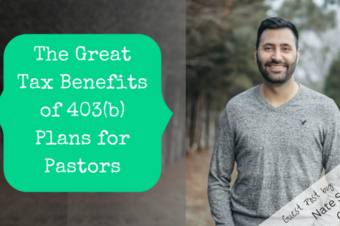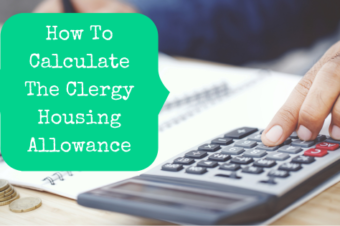This post breaks down all of the major types of income a pastor can earn and explains how the IRS treats them for Social Security, income tax, retirement plan and payroll tax purposes. It is based on IRS Publication 517.
How Do You Save For Retirement Without A Workplace Retirement Plan?
How much do you have saved for retirement? Do you think it will be enough? A quarter of American adults have absolutely nothing saved for retirement. This is why you may have heard talk of our nation’s retirement crisis. Most seniors have not accumulated enough money to live on in retirement. This is an even bigger problem among pastors since many have exempted themselves from Social Security.
For most people, the majority of their retirement savings are in a workplace retirement plan, like a 401(k) or 403(b). However, many independent pastors and employees of small businesses have no workplace retirement program available to them. How are they supposed to save for retirement?
What Is An IRA?
If you don’t have access to a retirement plan at work, your only tax-advantaged option is an individual retirement account (IRA). IRAs are available to anyone with an income and their spouse. IRAs are tax-advantaged because depending on the type, either your contributions are tax-free or your withdrawals are.
The big downside to IRAs is their contribution limits. For 2020, the limit is $6,000 a year before you turn 50 and $7,000 afterward. If you start saving young and get a good return on your investments, you can probably save a decent nest egg. However, if you’re well into your 30’s and beyond, you may be looking for other options.
What Is An Individual Brokerage Account?
Without a workplace plan, your only other option is an individual brokerage account. These are not specifically retirement accounts, but just general investment accounts. Anyone can open one, but they don’t get special tax treatment. You pay income taxes on the money that you put in, and capital gains taxes on the money that your investments earn. For more detail on opening a brokerage account, read this article.
What Should I Put In Each Kind Of Account?
If you decide to use both an IRA and a brokerage account for your retirement savings, you need to pay close attention to the investments you put in each. Because of their differing tax treatment, where you put your investments can make a huge difference in how much money you keep in the end.
In a brokerage account, capital gains taxes are due every time an investment is bought or sold. In a tax-advantaged account, taxes are only paid when you put the money in or take it out. What happens while the money is in the account doesn’t matter.
Mutual funds are a good investment vehicle for retirement. Mutual funds can be either actively managed or indexed. Actively managed funds have a team of really smart people buying and selling the stocks that they hold on a regular basis. Index funds hold investments in a set list of companies and rarely change.
If you hold an actively managed fund in a brokerage account, you will owe taxes each time the fund managers change the fund’s investments. Because of this, it is better to hold actively managed funds in your IRA where the fund’s turnover rate will have no tax effect. You will pay a lot less in taxes every year if you use your brokerage account for index funds, since they rarely change and incur taxes.
When looking at funds, check their turnover rate. Fidelity’s 500 Index Fund has a 4% turnover rate while their New Millennium Fund has a 44% turnover rate. Which one would you put in each account? If you want to keep your money invested instead of paying it in taxes, you would put the second fund in your IRA and the first in your brokerage account.
Are Those Really My Only Options?
No, they aren’t, but they’re your best ones. You could always save money in a savings account. But then, instead of growing your money you would slowly be losing it to inflation. Same thing if you keep it under your mattress. If you have a health savings account (HSA) and enough money to cash flow your medical expenses you can use the HSA for retirement. You can read about how to do that here.
In summary, without a workplace retirement plan, your retirement investing options consist of an IRA and individual brokerage account. IRAs are tax-advantaged, so you should max one out before adding a brokerage account. And once you have both, be careful which investments you have in each to limit your tax liability.
What The CARES Act Lets You Do (& Not Do) With Your Retirement Savings
With businesses shutting down and church services closed, you may find yourself reassessing your financial situation. Which expenses are mandatory and which can you do without? What resources do you have available to you that you don’t usually access? As you’re taking stock of your situation, I’d like to let you know about a few changes that the CARES Act stimulus bill makes to the rules about your retirement savings.
2020 Required Minimum Distributions Waived
This is one that really only helps those who already have more than enough to live on. Required minimum distributions (RMDs) from traditional IRAs, SEP IRAs, SIMPLE IRAs, and 401(k), 403(b), and governmental 457(b) plans are waived for the year 2020. The waiver applies to beneficiary account owners in addition to original account owners. Basically, no one has to take RMDs for 2020.
If you’ve already taken an RMD that you really don’t need, the law allows you to put it back. (This option is only available to original account owners, not beneficiaries of inherited accounts.) Unfortunately, putting it back isn’t quite as simple as it sounds. If your RMD was taken within 60 days, then you can roll it into another account or back into the same one. If your RMD was taken more than 60 days ago, then a more complicated strategy will have to be used. You will want to consult with a financial advisor if you have already taken an RMD for 2020 and want to put the money back into a retirement account.
Penalty-Free Withdrawals Allowed
For most of you, the above doesn’t apply. Instead of having extra money lying around, you’re looking for extra money to meet your expenses. The CARES Act makes it easier to tap into your retirement accounts. Usually, if you withdraw money from an IRA or employer-sponsored retirement account before you reach age 59 ½, you are charged a 10% penalty on the money. The government provides tax-advantaged accounts for you to save for retirement and they don’t like it if you take the money out before retirement.
The CARES Act allows you to withdraw up to $100,000 from your retirement accounts penalty-free if it is a coronavirus-related distribution. What’s a coronavirus-related distribution? It is a distribution made in the year 2020 by people who meet one of the following criteria:
- Have been diagnosed with COVID-19
- Have a spouse or dependent who has been diagnosed with COVID-19
- Experience adverse financial consequences as a result of being quarantined, furloughed, being laid off, or having work hours reduced because of the disease
- Are unable to work because they lack childcare as a result of the disease
- Own a business that has closed or been forced to operate under reduced hours because of the disease
- Meet other IRS-approved criteria
In addition to waiving the 10% penalty, these coronavirus-related distributions are not subject to mandatory tax withholding. Under normal circumstances, 20% of your withdrawals are withheld to pay taxes. So, if you withdraw $1,000 from your retirement account, you only get $800 because the other $200 is set aside for taxes. That isn’t happening right now; you get everything that you take out. Also, you can choose to pay any related income taxes over the next three years instead of all at once.
Should You Access Your Retirement Savings?
The CARES Act makes it a lot easier to tap into your retirement savings. But should you? That’s really up for you to figure out; my job is only to make you aware of the consequences.
The obvious consequence is that if you take the money out now, you won’t have it for retirement. However, using $2,000 today isn’t the same as having $2,000 in retirement. Let’s say you plan to retire in 30 years and you’ve got your savings invested in the stock market (which, by the way, had their best week last week since 1974) earning 8%. What is worth $2,000 to you today will be worth about $21,800 at retirement if left invested.
Another downside to tapping into your investments is that now is not a good time to sell. When it comes to investing, the way to make money is to sell when prices are high and buy when prices are low. The most popular way to lose money investing is to buy when prices are high and sell when they are low. Stock prices are pretty low right now, so depending on when you bought, you could be selling at a loss.
What Are Some Other Options?
If I’ve ruined the appeal of tapping into your 403(b), what are your other options? If your plan allows it (not all retirement plans do), then you may be able to take a loan from your current employer’s plan. The CARES Act increased the amounts that people are allowed to borrow from their retirement plans. However, that isn’t without risk. First of all, if you take the money out, then you miss out on any growth in the stock market until it is put back in (selling low again). Second, if you don’t pay the loan back (usually you have 5 years), it will count as an early withdrawal (as discussed above) and may be subject to the 10% penalty (depending on if it qualifies as a coronavirus-related distribution). Finally, if you lose your job, the loan will be due immediately, so you won’t have 5 years to pay it back and you’ll suffer the same consequences mentioned in the last sentence.
Are there any other options? Yes! If you’ve lost your job or even just part of your wages, you can apply for unemployment. The CARES Act made unemployment benefits much more broadly available than usual, so now independent contractors, part-time workers, and those experiencing a pay cut can be eligible. And the Act also increased benefits by $600/week and extended the length of time they are paid.
I know, you’re waiting for me to rain on the parade and start listing the negative consequences, as I’ve done in every other section of this article. There aren’t really negative consequences, but there is a downside. The downside is that unemployment has skyrocketed and most state unemployment agencies are not prepared to handle the applications coming in. So, it could take a while. I have friends who have been waiting for 3 weeks and have yet to see any benefits. But it doesn’t hurt to try, maybe your state is faster!
Finally, if you can’t make ends meet, see what hardship assistance is available to you. The CARES Act suspended payments on student loans through September and a lot of other companies are offering assistance. Talk to your landlord. Call your credit card companies. Call your auto or mortgage lender. Don’t be shy; ask for what you need. And don’t forget to pray before dialing the number! I have a feeling that during this season God is going to provide in some very creative ways.
The #1 Financial Regret Most Pastors Have
From time to time I read Thom Rainer’s blog to stay up to date on the issues that pastors are facing today. The most enlightening part is the comments that pastors leave on his articles. When I read the comments on his financial posts, my heart breaks.
There are so many challenges that pastors face that it makes me want to round you all up, give you big hugs, big thanks, a check for a million dollars, and a free week-long vacation on a private island with your spouse or family. And then go to your congregation and give some of the people a talking to.
But I can’t really do that, so I’ve chosen just one area, personal finance, where I feel I can actually make a positive impact on your lives. That’s why this blog exists.
What Pastors Regret Most About Their Personal Finances
In reading the comments on his articles and hearing from my own Pastor’s Wallet readers, it’s glaringly obvious that there is one financial area where most pastors end up with regrets. The older pastors are saying, “I wish I had listened when they told me…” and the young pastors are saying, “It’s just too hard right now…”
Can you guess what it is?
Saving for retirement. Like Americans in general, many pastors are saving nothing for retirement. Especially the younger ones. Unlike most Americans, a lot of these pastors won’t even have Social Security to fall back on in their old age because they have opted out.
Why You Need To Save For Retirement
Now, I know that some of you just aren’t planning on retiring. However, that might not be an option for you. If you don’t agree, follow that link and read the article.
Yes, you can pastor people and preach well into your 80s. But only if you’re sane and healthy. What happens if you get Alzheimer’s? Do you think you’ll still be pastoring then? Or what if you get cancer? My church’s senior pastor had to take a year off to fight cancer. I watched my dad do it, and believe me, you can’t just “keep working.”
Another common excuse I hear among Christians in general for not preparing for the future is “the Lord will take care of me.” Yes, the Lord will take care of you. He is taking care of you now, he gave you a job and tax-advantaged opportunities to save for retirement. He also gave you the Bible as a guidebook for life.
You know what the Bible says?
Go to the ant, you sluggard;
consider its ways and be wise!
It has no commander,
no overseer or ruler,
yet it stores its provisions in summer
and gathers its food at harvest. (Proverbs 6:6-8, NIV)
Several verses later it goes on to say that if you don’t heed this warning, “poverty will come on you like a thief and scarcity like an armed man.” (verse 11) In times of plenty, you are supposed to prepare for times of scarcity. Joseph understood that and we all know the incredible results of his wisdom.
You are working now. You need to prepare for times of scarcity, like when you cannot work any longer. God is providing now for your future needs. Don’t waste the opportunity that he has given you.
The Value Of Starting Young
When you’re young, you think of old age as being a lifetime away. Because, well, it pretty much is. But that makes it hard to think of the necessity of saving for retirement in concrete terms. It’s just not very real to you when you’re in your 20s.
However, that’s the most important time to be thinking about it. Why? Compounding interest. If you aren’t familiar with it, follow that link and read the article. When it comes to saving, compound interest makes time your most valuable asset.
If you start to save $20 a month when you are 25 and it grows at a rate of 8% until you are 65, you will end up with $69,820.

If you wait until you are 45 to do the same, you will end up with $11,780. Your total contributions are half what they would have been if you had started younger but your growth is only 12% of what it would have been.

To start at age 45 and get the same results as the 25-year-old putting away $20, you would have to save over $118 a month! You see why it’s so valuable to start saving early?
It’s Never Too Late To Start Saving For Retirement
That’s all fine and dandy, Amy, but it’s a little too late for me to start saving young. Is there any hope?
Yes! If you’re getting on in years and haven’t been saving much, you may find this article pretty depressing so far. Cheer up! While you may have missed out on some opportunities, it’s never too late to start saving. Even if you’re 50-years-old, if you start saving $350 a month and don’t retire until age 70 you’ll have over $200,000 to live off of with an 8% rate of growth.
The good news is that pastors usually don’t need as much saved for retirement as some other people. Why? You’re used to living on less.
The two major factors in retirement planning are how much you’ve saved and how much you spend. Some people have such a lifestyle where even having $5 million in savings won’t be enough.
Even if it’s too late for you to save a lot for retirement, you can develop a lifestyle that will not require a lot in retirement. And that can be just as powerful.
How Do You Start Saving For Retirement?
While you may be convinced of the importance of saving for retirement, that doesn’t mean you have any clue what to do about it. It’s okay, I was in the same boat. Until I sat down with a financial advisor, I had no idea what to do with money beyond my Bank of America savings account. And I wasn’t going to get very far with my savings with that 0.04% interest rate.
That 1½ hours with a financial advisor completely changed the trajectory of my family’s finances and I know its impact will be felt for multiple generations. While I’m a proponent of working with a financial advisor on a regular basis, I understand that it simply isn’t feasible for many people. However, I know from personal experience that even just an hour can be life-changing.
Because of this, I would encourage every one of you to do just that: sit down with a financial advisor for an hour or two so that he or she can get you on the right track for retirement.
If you don’t know a trusted financial advisor, my friend Ben Wacek of Guide Financial Planning is a Certified Financial Planner™ and Certified Kingdom Advisor® who works with pastors on a regular basis, mostly via video calls. He offers Quick Start Sessions where he will sit down with you for one to two hours and answer any questions you have and help you figure out a plan for your finances. You’ll also get a written summary of your meeting that clearly outlines the next steps you need to take, all for $500. You can schedule a Quick Start Session directly on his calendar using this link. He’s even agreed to offer a $50 discount to anyone who books before February 29, 2020 and mentions Pastor’s Wallet.
Five hundred dollars is a lot, but I am fully convinced that it will be more than worth it for you. If you don’t have an extra $500, go talk to one of the businessmen or businesswomen in your congregation. Tell them that you want to meet with a financial advisor (who won’t be selling you any products) in order to be a better steward of your finances and ask them to foot the bill. I’d love it if my pastor asked me that and I’d bend over backward to make it possible. (This is a good test to see if my pastor reads this blog!)
Full Disclosure: I do work with Ben on a part-time basis but receive no commission or monetary benefit if you choose to work with him. My only incentive is to help you make the most of the money God has entrusted to you.
If you won’t meet with a financial professional, at least open up an IRA and start putting some money into it. Make sure the money is invested so that it can grow. If you’re not interested in learning all about investments, just stick it in the Target Date Fund where the year is closest to your anticipated retirement. Then set up automatic contributions from your bank account. Even if that’s all you do, you’re heading in the right direction and ahead of a lot of your peers.
Free Resources To Help You Master Your Personal Finances In 2020
It’s a new year, a new calendar, and many are hoping, a new beginning, too. The sense of a fresh start with the new year leads a lot of people to make new year’s resolutions. How about you?
Since 51% of 2019 new year’s resolutions were to save money, I figure some of you are looking to tackle your finances this year and I want to help. Below, I’ve listed 15 different free resources ranging from budgeting systems and high-yield savings accounts to Social Security estimators and housing allowance tools. There’s quite a variety, so there’s something for everyone.
Basic Financial Management
Easy-To-Use Budget Template
The same study I referenced above found that 35% of new year’s resolutions were to stick to a budget. That’s a lot. Budgeting is the foundation of any successful financial life. It looks like people realize the importance of budgeting but they struggle to do it.
One of the reasons budgeting is hard is because you’re often trying to track 20+ different spending categories. I don’t know about you, but I can’t track that many things at once. That’s why I only have 2 kids.
Ben Wacek, CFP™, of Guide Financial Planning uses an innovative way of budgeting where you don’t have to do that. Instead of burning out attempting to track a bunch of different spending categories, you only focus on the handful that you really have control over. If you’ve ever struggled with budgeting, then you’ll love his system. You can download it in exchange for your email address here and he even made a video that will explain the whole process to you.
High-Yield Savings
Do you have your emergency fund sitting in a savings account earning 0.03% interest? You can do much better than that! If you transfer your money to an online high-yield savings account you can earn 60 times as much in interest. (No, that is not a typo. It is sixty.) The best part is that those accounts are FDIC-insured just like your current bank account, so you’re earning higher interest without taking on any additional risk.
Ally Bank is an online bank that offers high-yield accounts. If you click that link, they also have a great savings comparison tool that shows you the difference in interest earned among the most popular savings accounts. I moved my emergency fund from Bank of America to a CapitalOne 360 account and am now earning hundreds of dollars instead of just dollars in interest. It’s pretty cool.
Online Financial Management Tool
If organization is your priority this year, then Flourish Financial Planning has a great tool for you here. It’s a free online financial management tool where you can input all of your information to see your whole financial picture in one place. It also includes software that can help you visualize the effects of different financial situations and decisions you may be facing using your own personal numbers.
Unclaimed Property
Did you know that you may have money that you’re not even aware of? There are billions of dollars of unclaimed property out there. It could be anything from forgotten bank accounts and 401(k)s to unclaimed refunds or lawsuit settlements.
Each state has a database that you can search and you can access them all at Unclaimed.org. In addition to the 50 US states, that site also links to searches for Washington, DC, Alberta, British Columbia, Kenya, New Brunswick, Puerto Rico, Quebec, and the US Virgin Islands. Sadly, I don’t have any unclaimed property, but I found that my aunt has $40 in “misc unclaimed checks.”
Clergy Issues
Pastor’s Wallet Resource Page
A lot of you find your way to this website because you have questions about clergy-specific financial issues. There aren’t a lot of resources for pastors like you online, which is why I’m here. I just put together a brand new page chock full of free resources, including housing allowance and net worth calculators, downloadable housing allowance worksheets, a checklist for getting your finances in order, and several other housing allowance-related tools. You can check out the new page here.
Pocket Guide To The Clergy Housing Allowance
Another new resource I just created is the Pastor’s Wallet Pocket Guide To The Clergy Housing Allowance. The housing allowance is one of the most misunderstood and under-utilized financial opportunities for pastors. This is not a comprehensive guide (that would take a book, which I’m working on right now), but more of the Cliff Notes for the housing allowance. All of the most important information is presented in simple bullet points and easy-to-reference facts. It’s a special treat for those who sign up for my updates, so even if you’re already on my mailing list, go ahead and use the bar at the top of the page to get access.
Clergy Tax Withholding Calculator
One thing that gets more complicated when you become a pastor is your taxes. Because pastors are dual-status taxpayers, traditional tax calculators that you find online don’t always work. The people over at StartCHURCH had compassion on you and developed a tax withholding calculator designed for clergy and your unique issues. It’s even state-specific and you can check it out here.
Tax Resources For Pastors And Churches
Taxes are a big deal and it’s hard to find a CPA or tax professional who actually understands the intricacies of how they apply to pastors. Wayne Vinson, CPA of Vingroup, however, is well versed in taxes and how they apply to both pastors and churches. They have a resource page with helpful tax forms and a good Request for Housing Allowance that you can personalize.
Church Accounting Help
The fact that clergy taxes are complex and confusing is a thorn in the side of most church bookkeepers. Also, IRS rules regarding churches are different than for other organizations and there isn’t a lot of reliable information out there. Freechurchaccounting.com is a wonderful resource for anyone involved in church finance. The site has an amazing amount of information and, best of all, it is actually accurate!
Debt
Debt Repayment Calculator
When it comes to your financial life, debt is like a giant millstone that you have to drag around with you everywhere you go. It affects the calls you can answer and how you make financial decisions. Most people just pay their minimum payments and dream of the day that their debt will go away.
It doesn’t have to be that way, though. If you have specific goals in mind, then you can adjust your payments to allow you to reach those goals. This debt repayment calculator lets you look at debt repayment based on payment amount or desired payoff date. It also shows you how much interest is paid over time and how increasing or decreasing your balance would affect things. The calculator works for everything from credit cards to student loans.
Student Loan Income-Driven Repayment Calculator
When it comes to student loans, you often have various options for repaying them. The government has several different income-driven repayment plans that base your monthly payment on your income. This calculator, built by a family-focused financial planning firm, will show you what your payment would be under each program so that you can decide the best program for you and your family.
Investing & Retirement
Investment Calculator
Once you free yourself from the burden of debt, it is important to focus on saving for the future. This investment calculator, brought to us by the famous Dave Ramsey and crew, will show you what to expect of your investments based on your time horizon and expected returns. There are a lot of investment calculators out there, but I like this one because of the way it is laid out and the graphs it provides that show the power of compounding interest.
Dave likes to use a 12% rate of return for his calculations, but if you invest in anything other than stocks or use a target date fund, there’s a slim chance that you’ll get such high returns. It’s safer to be conservative in your estimates. Also, it’s important to remember the effects of taxes when looking at your final expected returns.
Social Security Retirement Estimator
In addition to your personal investments, Social Security benefits will be an important part of your retirement planning if you didn’t opt out or are eligible for spousal benefits. For planning purposes, you can use this estimator from the Social Security Administration to get an idea of what to expect. You should also review your Social Security earnings history regularly by setting up an account at ssa.gov to make sure they have the right numbers for your estimates.
Retirement Savings Calculator
If you want to calculate how much you need to be saving for retirement, then here is a calculator for you. You can input your age, your current income and savings, when you plan to retire, and how much you expect to receive in Social Security benefits. It will tell you how much you should be saving to reach your goals, in dollars and as a percentage of your current income. It shows a graph of how your money will grow and then be spent down in retirement and tells you how much more you’ll need to save if you put it off.
Retirement Withdrawal Calculator
There is a lot of focus on saving for retirement, but what happens when you actually retire? You have to switch things around and start spending down your accounts instead of saving into them. That can be really scary.
If you want to know how long your money will last you in retirement, then this calculator can help you. Enter the balance you will be starting retirement with, the interest you’ll be earning on the money, and how much you’ll be taking out each year. Then the calculator will tell you how long your savings will last. It’s a great calculator to play around with because you can look at the effects of increasing your savings or decreasing your retirement spending.
Professional Help
Sometimes things are beyond your DIY abilities and you need to consult with a professional to master your personal finances. Professional help is not free, but it can be more than worth it. If you’re at the point where you need to talk to a professional, you can find one here:
- XY Planning Network– These advisors are highly-trained Certified Financial Planner™ professionals who swear to work in their clients’ best interests and also offer virtual services so that your location doesn’t matter.
- Fee-Only Network– These are advisors who do not accept commissions, so their advice is less conflicted and more likely to be in your best interest.
- Garrett Planning Network– These are fee-only (no commission) advisors who are willing to work on an hourly basis.
- Kingdom Advisors– These are Christian financial professionals who have received in-depth training on the integration of the Bible with finance.
Do You Know What Your Spouse Thinks About These Key Financial Topics?
While premarital counseling addresses a lot of expectations that we enter marriage with, anyone who has been married for over a day knows that there is no end to the surprises of how our spouse sees things. There are so many things in life that we take for granted and don’t even realize there is another way of viewing them. Until we get married.
Personal finance is a typical area for this. Usually, we assume that the way we grew up is normal. The way our family did things and viewed things is how everyone does. But that’s simply not true.
There are a lot of areas where spouses can have different opinions without ever realizing it. Unfortunately, those differences usually wait to reveal themselves in the heat of the moment when emotions are high and a decision has to be made.
Save yourself some trouble and have these discussions now, while you still have time to ponder each others’ point of view and come to a mutual understanding. Remember, most of these topics don’t have a right or wrong answer, rather they are a matter of personal experience and values.
Have you and your spouse discussed:
Do You Tithe On Net Or Gross Income?
I’m putting this question out there first because I think it’s the easiest one. There are only two options and if you’re a pastor, I hope you’ve discussed this already.
But you can take it beyond net or gross income: Where should your tithe go? Does it go to the local church you attend or to any ministry you believe in? Is it required or optional? Do you feel led to give beyond the tithe? Where will that money go? How will you determine how much to give?
Will Your Kids Be Expected To Work While In School?
Kids should be kids and not have to worry about jobs or adult responsibilities. It’s important for kids to get a job and carry their weight. They need to build a work ethic. If I can afford what they need, why would they work when they should be focusing their time on their studies?
There are a lot of different opinions and views on kids working while in high school and college. The only opinion that really matters in your case is your spouse’s. Don’t worry about what your friends, parents, or even kids think. You and your spouse need to come to an agreement and everyone else can just live with the consequences.
You should actually start this discussion long before your kids are old enough to hold a real job. Will your kids be expected to do chores? At what age? Will they be paid for them? If they receive an allowance will it be tied to work being done or not? When your kids are old enough to drive, who will pay for the car, gas, and insurance? What about school or missions trips? What luxuries are you willing to provide for them and what are they responsible for?
Whose Responsibility Is It To Pay For College?
“Doesn’t your dad have to pay for college?” I still remember a friend’s innocent question when I said I’d be attending a community college for lack of funds. She didn’t understand the concept that some dads simply don’t have money to pay for college. Your view on this will have a lot to do with how you were raised and what your parents did for you.
Personally, I’d like to help but I’m not going into debt or sacrificing my retirement for my kids’ education. As they say, you can take out loans for college but not retirement. My kids are just as capable of working their way through school as I was.
But that’s just my own personal opinion and value. For you, it might be different and that’s okay. Just make sure you and your spouse agree. Will you help your kids pay for college? How much help are you willing to offer? Are you willing to take out loans or co-sign for them? Is your assistance unconditional or do you expect them to maintain a certain GPA or lifestyle? How many years or what level of degree are you willing to help with? What happens if one kid goes to college and another doesn’t?
Will You Quit Working At Age 65 For A Traditional Retirement?
While a complete cessation of work is still the common view of retirement, things are changing. Many people believe God created us to work and we should keep doing so as long as possible, even if only part-time. Others dream of “retiring” early in order to explore the world or a different career path. If your wife is planning on spending her golden years doting on grandchildren while you feel called to the mission field, it’s best to have that discussion now.
Are Your Retirement Savings For Your Consumption Or To Leave An Inheritance?
Proverbs 13:22 says, “A good person leaves an inheritance for their children’s children.” How important is that to you? How much “lifestyle” are you willing to sacrifice in order to have something left over for your heirs? Is it more important to travel and spend time with your family or leave them an inheritance?
As with most things, there isn’t a black-and-white one-or-the-other answer. There’s a spectrum that ranges from “I earned it and I’m going to spend every last cent” to “I’m going to live as cheaply as possible in order to leave a big inheritance.” Most people fall somewhere in the middle and you have to choose a place where both you and your spouse are comfortable to land.
How To Discuss These Topics
While you’ve probably already discussed some of these topics, chances are there are some that require a little bit more consideration. Maybe you discussed parenting before having kids, but now that you’re in the thick of it you realize that you had no idea what you were talking about before. Or, maybe your retirement dreams have changed over the decades and it’s time to reassess each others’ goals.
The two most important things to remember for these discussions is that there’s no one right answer and nothing has to be decided in one sitting. Start the dialogue and then pause it to give each other time to consider the other person’s views and pray about it. You might wait a week or even a month to pick up the topic again.
Make sure you understand the why behind your spouse’s opinions. If you’re having trouble agreeing on something, you may discover that your hearts are in the same place and it’s just the implementation that you disagree on. If you take the time to understand why your spouse feels the way they do then you will be more compassionate and better able to reach an acceptable compromise.
And remember not to take a difference of opinion personally. Just because your spouse doesn’t see something the way you do doesn’t mean they think you’re wrong, bad, ignorant, etc. Everyone sees the world through different eyes. Your spouse’s views likely have nothing to do with you.
Finally, pray. That may sound pretty basic, but don’t forget to pray about it. For all you know, God has a different opinion than both you and your spouse and he wants a say in the discussion!
How about you? What are other important financial topics that you think married couples need to discuss? What are your suggestions for having healthy and constructive conversations? Share with us in the comments!
5 Things I’ve Learned About Pastors & Their Finances After Working With Them For 5 Years
This is a guest post by Ben Wacek, Certified Financial Planner® and founder of Guide Financial Planning, where he offers clients Bible-based financial guidance both in-person in Minnesota and virtually throughout the country.
When Life Or Death Is A Financial Decision
I just finished a 2-year journey with my dad. It was that journey that inspired posts such as Do You Really Need All Those Papers?, Welcome To The Sandwich Generation, Be Prepared: When You Retire Is Not Your Decision, and 7 Estate Planning Mistakes That Will Rob Your Family Of Sleep. On Wednesday, that journey came to an end, and my dad is now in heaven, most likely ice skating and taking water samples of the river that John saw flowing from the throne of God.
How To Take A Pastor Housing Allowance In Retirement
If you’re a pastor, you know that your ministerial housing allowance is perhaps the biggest financial benefit of being in the ministry. It allows you to avoid paying taxes on all of your housing expenses, including things like cable television and landscaping.
Because of this, one of the most common questions pastors ask is if they can keep taking a housing allowance in retirement. The answer? It depends on where your money is coming from. Unfortunately, one of the most common pieces of advice that professional financial advisors give could actually disqualify you from taking a housing allowance in retirement.




















